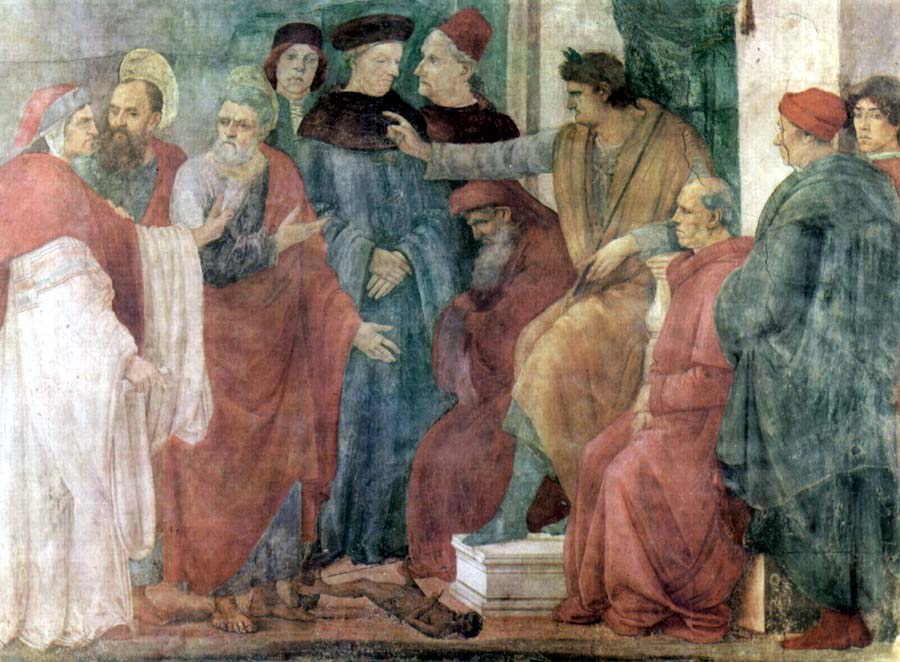The views expressed in our content reflect individual perspectives and do not represent the authoritative views of the Baha'i Faith.
Be not troubled in poverty nor confident in riches, for poverty is followed by riches, and riches are followed by poverty. Yet to be poor in all save God is a wondrous gift, belittle not the value thereof, for in the end it will make thee rich in God. – Baha’u’llah, The Hidden Words, p. 40.
“Rich in God”? What does that mean? For one answer, let’s look to early Jewish Christianity.
Earlier in this series, we met the Ebionites (“the Poor”), a sect of Jewish Christians who lived in Syria in Late Antiquity, during the third and fourth centuries. In some ways, the Ebionites offer a Christian worldview that resonates with certain principles of the Baha’i Faith—especially what Baha’is call the oneness of religion.
First, let me further introduce a remarkable document, the Pseudo-Clementine Homilies, which we’ve encountered before in its Syriac version. Syriac was one of the three international languages (the other two being Greek and Latin) in early Christianity. Syriac is a dialect of Aramaic, the language Jesus spoke.

The Apostles Paul and Peter confront Simon Magus before Nero
The term “Pseudo-Clementines” refers to surviving versions of an ancient Christian novel—the first, in fact, that we know of. This “family romance” recounts the adventures of Clement of Rome, who, shipwrecked and orphaned as a boy, is won over to Christianity by the apostle Peter, travels with Peter, and mysteriously experiences a series of revelations or sudden disclosures (“recognitions”) whereby Clement is providentially reunited with members of his long-lost family. The two major versions of this Christian romance novel survive in Greek and Latin. A less complete Syriac version also exists, and was recently translated by Joseph Gebhardt, whose translation we quoted earlier in this series. In 1978, Armenian fragments of the “Pseudo-Clementine” romance were published as well.
In Homily VIII of that book, Peter arrives in Tripoli. People from Tyre and Sidon, Berytus and Byblus throng together in a multitude, eager to hear Peter, who “promised to the multitudes that after the next day he would converse with them on the subject of religion.”
Peter is escorted to the house of a man named Maroones. Here, Peter “bathed in the sea, partook of food … and then, the evening having come, he slept.” Awakened the next morning by the second crowing of the rooster, Peter spoke privately to the fifteen other Christians who were with him.
Meanwhile, the crowd outside the doors of the house of Maroones were “conversing with one another in knots and circles.” Then Peter, “wondering at the eagerness of the multitudes,” recalled that Jesus had foretold all this in saying, “Many shall come from the east and from the west, the north and the south, and shall recline on the bosoms of Abraham, and Isaac, and Jacob” (Matthew 8:11) but that, of these great crowds, few would actually become Christians, “for many be called, but few chosen” – Matthew 20:16.
Then Peter explains that the purpose of following the prophets (whether Moses or Christ) is not only to believe in them (“believing in the teachers of truth is of God”), but to perform “excellent actions.” If not, then these “teachers of truth” would have come in vain, their purpose having been brought to naught: “Neither is there salvation in believing in teachers and calling them lords” (Hom. 8:5). In other words, it’s not enough to call Jesus, “Lord,” in order to be saved.
Then Peter goes on to explain that, in a sense, “Jesus is concealed from the Jews” and “Moses is hidden from those who have believed Jesus” (Hom. 8:6). Here, Peter primarily means that the truth of “Jesus is concealed from the Jews.” Now comes the remarkable part of Peter’s sermon, or discourse:
Neither, therefore, are the Hebrews condemned on account of their ignorance of Jesus, by reason of Him who has concealed Him, if, doing the things commanded by Moses, they do not hate Him whom they do not know. Neither are those from among the Gentiles condemned, who know not Moses on account of Him who hath concealed him, provided that these also, doing the things spoken by Jesus, do not hate Him whom they do not know. And some will not be profited by calling the teachers lords, but not doing the works of servants. For on this account our Jesus Himself said to one who often called Him Lord, but did none of the things which He prescribed, ‘Why call ye me Lord, Lord, and do not the things which I say?’ (Luke 6:46). For it is not saying that will profit any one, but doing. By all means, therefore, is there need of good works. Moreover, if any one has been thought worthy to recognise both as preaching one doctrine, that man has been counted rich in God, understanding both the old things as new in time, and the new things as old. – The Clementine Homilies, Homily VIII, Chapter 7, translated by Peter Peterson, M.A., Ante-Nicene Fathers, Vol. 8, p. 926.
When I first read this passage, years ago, I was stunned! Here’s the parallel passage in Recognitions of Clement:
… But the method of works is put into the power and will of every one, and this is their own; but to have an affection towards a teacher of truth, this is a gift of the heavenly Father. But salvation is in this, that you do His will of whom you have conceived a love and affection through the gift of God; lest that saying of His be addressed to you which He spoke, ‘Why call ye me Lord, Lord, and do not what I say?’ (Luke 6:46) … But he who is of the Gentiles [a Christian], and who has it of God to believe Moses, ought also to have it of his own purpose to love Jesus also. And again, the Hebrew [a Jew], who has it of God to believe Moses, ought to have it also of his own purpose to believe in Jesus; so that each of them, having in himself something of the divine gift, and something of his own exertion, may be perfect by both. For concerning such an one our Lord spoke, as of a rich man, ‘Who brings forth from his treasures things new and old’ (Matthew 13:52).” – Recognitions of Clement, translated by Rev. Thomas Smith, D.D., Ante-Nicene Fathers, Vol. 8, p. 357.
The long and short of it is this: The oneness of religion was once a Christian doctrine. For whoever “has been thought worthy to recognise both [Moses and Jesus] as preaching one doctrine, that man has been counted rich in God.”
The same holds true for the Baha’i belief in the oneness of religion — but more inclusively and universally so — since Baha’is not only believe in Moses and Christ, but in all of the founders of the great world religions, including, among others, Krishna, the Buddha, Zoroaster, Muhammad, the Bab and Baha’u’llah. Many Native American and Native Canadian Baha’is recognize the truth of Deganawida, “the Peacemaker,” as well.
Believing in the truth of all these Faiths—that’s one way to become “rich in God.”
You May Also Like
Comments

















Especially love your reference to Deganawida: I've been singing His praises and those of the Iroquois Confederacy as the foundation of states rights vs Federal rights, and democracy, for years. Our American civilization did indeed begin on the backs of the labors of our American Indian brothers and sisters.